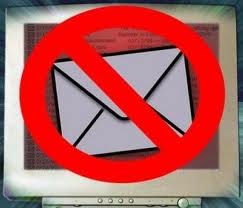OK, this post is admittedly a bit off-topic, but it’s something I needed to get off my chest…
The other day I received an email from someone whose name seemed slightly familiar, but I couldn’t place who he was.
The email was mass-mailed to about a dozen people, and it landed in my  Junk folder (affirming that the sender is not among my contacts).
Junk folder (affirming that the sender is not among my contacts).
This email was the sender’s attempt at networking. Here’s how it read:
HELLO,
I am seeking help in my job search to find leads, ideas and suggestions to finding positions that would match my backgound and areas of expertise and knowledge.
I am seeking any leads and/or referrals or any information on positions that match my skill in programming analysis, quality assurance testing, software design or development, software support, information technology and communications system designs. Please see the attachments that show my specific areas of expertise and knowledge and previous use of these skills.
I would appreciate any help you can provide and any suggestion you can make as to how and where to seek employment.
Sincerely Yours,
Several things are wrong with this approach:
- The email was not sent to me individually. Just the fact that I was one of a dozen recipients shows how impersonal and spammy the job-seeker’s approach was.
- The email did not address me personally.
- Maybe the sender assumes I remember who he is, but that’s probably not a wise assumption (since I don’t). A good opening would have been: “Dear Kathy, Perhaps you remember me from …”
- “backgound” is misspelled in his first paragraph.
- He refers to attachments, but the email had no attachments. I thought maybe my email app strips attachments off of emails that go into the Junk folder, but I just checked; plenty of emails in the Junk folder have attachments.
- He refers to attachments, plural. It’s perfectly reasonable to send a resume with a networking email, but any more attachments than that puts too much of a burden on the recipient.
- His message is straightforward and not unreasonable, but it lacks any warmth, friendliness, or personal connection.
- Asking for “help” in a networking request is on the fringes of inappropriate — or at least ineffective — behavior. It’s much better to ask for advice. People like to be asked for advice because it makes them feel knowledgeable and important.
- Networking should be a mutual, sharing activity. The sender should have indicated willingness to do something for me or shared information he knew I would appreciate.
Update: I got the same email TWICE MORE again from him — this time mass-mailed to 214 people (!!) and with the attachments.
